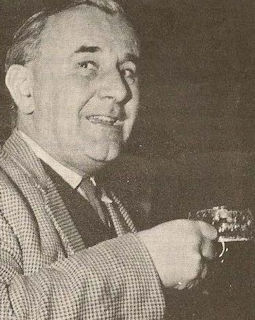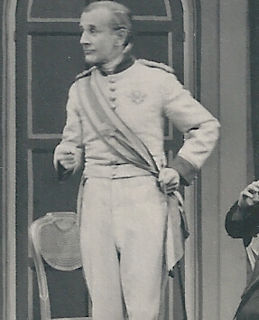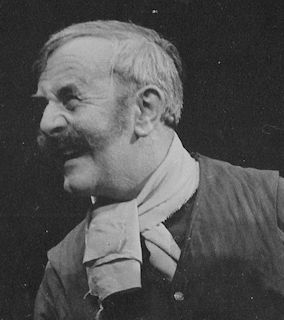|

With the recent death of Wilf Sharp we have lost one of the most colourful personalities of the tin hut days.
Wilf started acting at The Questors during the war, and over
the next forty years played an enormous variety of roles, seemingly having a predilection for Irish parts. He was
immortalised in Mike Green's The Art of Coarse Acting as the actor playing a god in Amphitryon 38, who took his bottles of light ale up on his cloud above the stage only to have them explode in the heat of the lights showering the actors below.
He taught English at Latymer, where he gave his enthusiasm for theatre full rein
both in the classroom and on stage. He always encouraged budding actors, and
indeed gave me my first serious acting roles and later introduced me to The
Questors. Alan Rickman was one of his more famous proteges.
He was a convivial companion and liked nothing better than fierce discussion in
the Grapevine after a show, propounding and justifying his standards and beliefs about theatre with an almost religious fervour. Sadly increasing infirmity had kept
him away from The Questors for several years, and we were denied the sight of
Wilf lurching along Mattock Lane on his bicycle at the end of such an evening. I
shall remember him fondly.
Tony Barber
Extract from Questopics 48 (May 1968)
 As a schoolboy Wilf Sharp
commenced his acting career playing
a statue of love in Granville Barker's As a schoolboy Wilf Sharp
commenced his acting career playing
a statue of love in Granville Barker's
Prunella. This role, in an era long
before the directness employed by
Peter Brook at the National heatre,
was far less priapic than is
suggested in its description.
Wilf went to school in Herefordshire,
and though a Londoner, wears to this
day in character and appearance
much of the bucolic generosity of the
English shires. His is the face and figure that has marched with sturdy good humour in every English army
from Agincourt to Alamein. Fittingly
he served in the Desert Rats during
the second World War and became a leading member of an 8th Army
Concert Party—'The Rat-Tat-Tats'.
Not much of the foregoing would indicate that Wilf is an academic, a term he will hate, but he is head of
the English Department at Latymer
Upper, a Chief Examiner at 'A' levels
and an author. His book of plays for school children is widely used, and
he, and no doubt many a drama teacher, remarks delightedly that each play has thirty or more parts. Somehow he manages also to find time to skip about the world lecturing for the British Council.
 This intimidating volume of activity is supplemented by producing and acting with
'The Court' drama group, now celebrating its thirtieth anniversary. He also continues to be a known and popular customer in the locals near his home on Hammersmith Mall. This intimidating volume of activity is supplemented by producing and acting with
'The Court' drama group, now celebrating its thirtieth anniversary. He also continues to be a known and popular customer in the locals near his home on Hammersmith Mall.
`Yes', you are now impatiently asking, `But what has all this to do with Questors?'
Briefly, a lot, for Wilf has been an active and acting member with us for many a
year. He is an ex-member of the Committee of Management and wrote the first
appeal for the New Theatre Fund, continuing to act meanwhile in our old tin home.
A man for the occasion, he conducted the farewell grace notes to our old theatre by producing the last revue Going-Going as the demolitioners were moving in. Some years before that he produced several revues for us and a delightful You
Can't Take It With You.
Those of you who have read Mike Green's Art of Coarse Acting will perhaps remember the actor c ondemned by his part to spend much of the play suspended on a property cloud out of sight in the flies. To improve the shining hour the actor
consoled himself with two bottles of light ale. He forgot the heat of the lights and
the volatile nature of the ale. The bottles exploded supplying, unexpectedly, ondemned by his part to spend much of the play suspended on a property cloud out of sight in the flies. To improve the shining hour the actor
consoled himself with two bottles of light ale. He forgot the heat of the lights and
the volatile nature of the ale. The bottles exploded supplying, unexpectedly,
thunder and rain. The theatre was Questors, the play The Trojan Horses and the actor Wilf. It would be misleading, and slightly unflattering, to suggest that all of
Wilt's roles are punctuated with such happy unrehearsed effects. He is an actor of
quality and is still fondly remembered for his Player King in our production of Hamlet. You saw him last playing Boniface in The Beaux' Stratagem in which he had played the lead in our first production of this many years ago. His first part
with us was in Playboy of the Western World with the leads played by Kit and Alfred Emmett. He also played lago, one of Shakespeare's longest roles, for us.
Wilf, apart from his other writing, always enlivened the last-night parties by writing
skits on the plays performed. By some magic of dramatic compression he once
reduced Hamlet to ten minutes' playing time. It also contained the memorable line
"Let's get dirty, Gerty"..
His multiplicity of activities and the fact that he is now three-quarters of the way to
being a grandfather for the second time leaves Wilf with little enough spare time. Some of this we hope he will continue to use at Questors, delighting us all.
WILF SHARP AT THE QUESTORS
|
